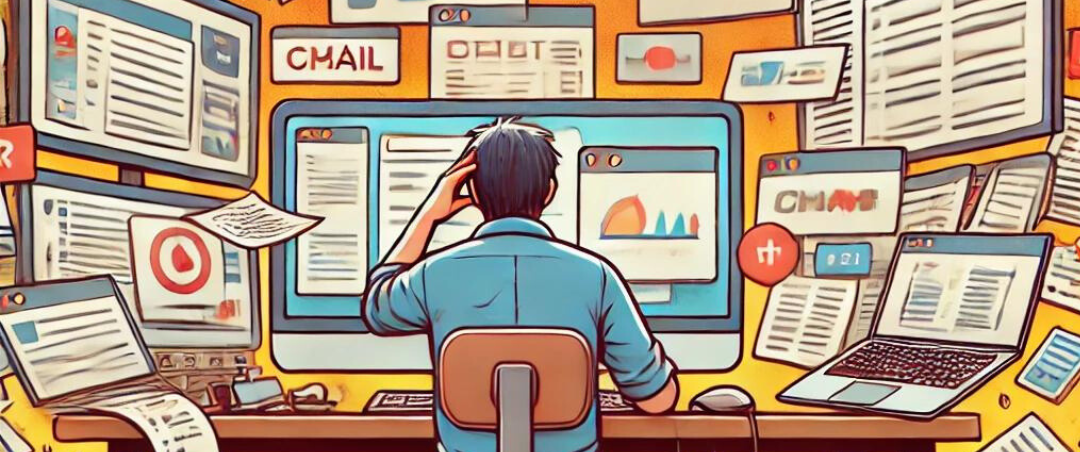We’re at a pivotal crossroads, where the proliferation of AI tools, apps, and productivity platforms that promised to make our work lives easier has instead left us feeling more overwhelmed than ever.
The sheer number of tools that knowledge workers rely on today has, paradoxically reversed the intended productivity gains and hampered our human capacity and creativity. In fact, during several conversations with various folks working in tech, I’ve heard the same story time and again - they’re mentally exhausted. Despite having more tools at their disposal, they’re constantly stuck doing what one person called, “the work before the work.” You know - all the copy/pasting, organizing, updating, and manual coordination of the information you need, in the apps you use, to get the context you need to help you get your work done.
Too Many Tools, Not Enough Clarity
What’s become increasingly clear from these conversations is that, while these apps offer valuable functionality, they create chaos and cumbersomeness because of the inherent volume of information we now need to track, manage, and retrieve across platforms. From toggling between tabs, searching for documents, linking relevant conversations, and managing spreadsheets, we’re dealing with a constant uphill battle of disorganization.
As one person put it, the ‘mental gymnastics’ hurt her brain because all these tools make things “far less efficient, far more chaotic, far more swirly, and a lot less organized.” And I know many of us can relate!
Another person I chatted with shared how they spent more time managing and linking multiple documents, emails, Slack threads, and files within apps than actually doing the core work. This constant need to manually manage context across disjointed platforms is mentally fatiguing and is driving inefficiency.
Some folks mentioned feeling like they spend half their workdays just searching - either for the right document, a forgotten email thread, a note jotted down somewhere, or the context for a decision that was made weeks earlier.
The Missing Link: Contextual Awareness
So what’s the issue here? Why aren’t the latest AI tools and/or productivity tools making us more productive? Well, despite all the apps and AI agents, there’s a glaring gap, a missing link - something our traditional desktops can never give us. The problem is that the system within which all these apps operate (our computer’s graphical user interface or GUI) is not contextually aware.
Contextual awareness is exactly what it sounds like - the ability for a system to understand the broader context of your work - what you’re working on, what tools you’re using, who you’re collaborating with, and why. As humans, we do this naturally. We remember meetings, ideas, and relevant information and we carry that understanding forward. But our computers, despite all their power, are still in the dark. We’re the ones connecting the dots for them, over and over again.
As a concept, contextual awareness means having a deep understanding of the full scope of what’s happening around a particular task or project. It’s what allows us to make quick decisions, because we instantly process and remember what’s already occurred and why. In today’s world, our tools don’t naturally do this with each other. They treat each task as an isolated incident, forcing us to bear the cognitive load of piecing everything together ourselves.
As a technology, contextual awareness isn’t something that can simply be “tacked on” to our current systems. It requires a new infrastructure. Just like HTML and HTPPS came together to create the internet as we know it - enabling seamless, secure data transfer and standardizing how we browse websites - contextual awareness requires a new language and protocol to fundamentally change how our computers identify, organize, process, and surface information.
Our current desktop environment - the GUI - isn’t designed to carry context across different apps, tools, and workflows. Each application lives in its own silo. Think of it like early websites and the introduction of HTTPS. While they provided content, they didn’t communicate securely or seamlessly across platforms. Same with our computers today - apps are disconnected, and it’s up to you to manually bridge the gaps.
To make contextual awareness possible, we need a new wraparound infrastructure for our current desktop environments. This new layer would serve as a system-wide protocol that enables your computer to track, retain, and intelligently surface the context of your work across all your apps and tools in the form of Streams. It would make sure that your computer knows not just what task you’re performing, but why, how it links with other tasks, and what resources are relevant - all without you having to constantly link and connect anything.
In a nutshell, contextual awareness would transform your desktop into a fully integrated system where apps, documents, and workflows are organized by their relationship to one another. Instead of jumping between scattered tools to find your work, you would experience a cohesive flow of work in your Streams, where everything is organized based on the broader context of your projects or initiatives.
This technological shift is the missing infrastructure needed to unlock the true potential of AI agents and advanced productivity tools. Only with this foundation in place can these tools stop being reactive and start becoming proactive, working seamlessly alongside you to achieve your goals.
The Future of Work
That’s why we’re saying that the future of work is contextual. It will be shaped by systems that are contextually aware, much like Reframe’s Organized Work Environment (OWE). Humans, AI tools and apps will not reach their full potential until they’re part of an environment where context is carried across platforms, seamlessly linking projects, tasks, and tools. This is the leap forward that will finally unlock the power of all the technologies we’ve been amassing.
Imagine a world where AI agents can assist you not just by responding to individual prompts, but by having access to the full context of what you’re working on - offering strategic insights, helping you plan your next steps, or even anticipating the resources you need. That’s the future of work.
At Reframe, we believe the future hinges on building technology that carries context across your entire digital workspace. Instead of you doing the “work before the work,” our technology will handle that for you! And in doing so, we’ll empower you to do what humans do best - creativity, problem-solving, and innovation.




